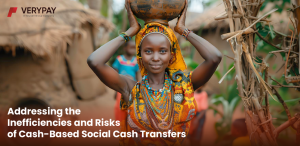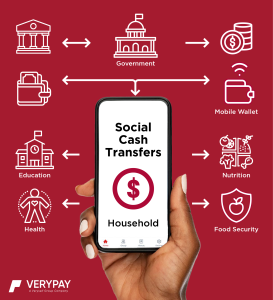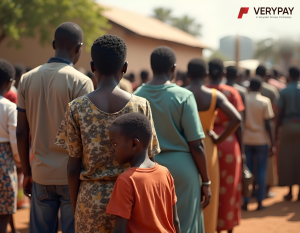
In many parts of sub-Saharan Africa, Social Cash Transfers (SCTs) are crucial in supporting vulnerable populations by providing financial aid. These programs distribute assistance directly to individuals and households in need, helping them cover essential costs like food, education, and healthcare.
SCT programs are widespread across the continent. Countries such as South Africa, Kenya, Malawi, and Nigeria are rolling out large-scale SCT programs. In Nigeria, the government has pledged to provide cash transfers to around 25 million vulnerable citizens, aiming to improve health and education outcomes.

Africa’s Social Cash Transfer programs aim to support poverty-stricken households in areas such as health, nutrition, education, and food security.
However, many SCT systems rely heavily on cash-based methods, which present significant challenges and risks. As countries look to modernize these systems, addressing these limitations is critical to improving the effectiveness and safety of SCT programs now and in the future.
The Challenges of Cash-Based SCT Systems and Why Optimisation is Necessary
Given the risks and inefficiencies inherent in cash-based SCT systems, there is a growing consensus that these methods are no longer sufficient to meet the needs of the most vulnerable populations. Many governments and organizations are now exploring digital payment systems as a more practical alternative.

Long Queues and Dangerous Delays
Cash-based SCT programs often require beneficiaries to queue for long periods at designated collection points to receive their payments. These delays can lead to dangerous situations, such as the stampedes in Senegal, where crowded collection points resulted in injuries and fatalities.
In regions with poor infrastructure, beneficiaries may spend days traveling to and from collection points, further delaying their access to much-needed financial assistance.
An Even Greater Security Risk for Vulnerable Populations
Carrying large sums of cash poses serious security risks, especially in areas where crime is prevalent. After collecting their funds, beneficiaries must often travel long distances back to their homes, making them vulnerable to theft and robbery.
This danger is especially concerning for women, elderly individuals, and those living in remote areas. For these groups, the physical act of carrying cash can cause significant anxiety and leave them exposed to harm.
High Operating Costs
Cash-based systems are resource-intensive, requiring significant effort from governments and aid organizations to manage physical distribution. According to a report on Social Cash Transfers in Sub-Saharan Africa, the administrative costs associated with manual cash transfers can consume up to half of the program’s budget. In cases like Lesotho’s SCT program, logistical costs for security and transportation make cash distribution costly and inefficient. These inefficiencies not only slow the process but also reduce the overall funds available to support beneficiaries.
Fraud is Common
Cash-based transfers are prone to fraud, including ghost beneficiaries—individuals who do not exist but still receive payments due to loopholes in manual systems. Fraud reduces the effectiveness of SCT programs and undermines public trust in these systems.
Biometric audits in Nigeria helped eliminate 37,000 ghost pensioners from the government payroll, reducing fraud and saving substantial funds, an indication that this fraud is alive and well.
Time for a Change: Why Digital Payments Are the Way Forward

As governments look to modernize SCT programs, digital payment platforms are emerging as a clear solution to many of the problems associated with cash-based systems. These technologies provide a safer, faster, and more cost-effective way to deliver aid directly to beneficiaries.
In 2021, a World Bank program successfully piloted mobile money transfers to almost 3,000 households in the Mopti region as an alternative to standard cash disbursement methods.
Participants found that using mobile technologies to access their payments was easier, faster, safer, and with fewer associated costs. This pilot provides strong evidence for expanding mobile money transfers in social safety net programs.
Contactless Payments for Security and Efficiency
By shifting from cash-based disbursements to contactless digital payments, SCT programs can address both security and efficiency concerns. Beneficiaries can receive funds directly into secure mobile wallets or digital accounts, eliminating the need to carry cash and reducing theft risk. Additionally, digital disbursements reduce wait times, allowing aid to be distributed more quickly.
Expanding Access with Wearable Tech

While many digital payment systems rely on smartphones, not all beneficiaries have one. Therefore, innovative solutions like wearable devices offer a more inclusive alternative.
For example, beneficiaries can use simple, tap-and-go bracelets to access their funds without needing a smartphone or complex technology. This makes digital payments accessible to even the most underserved populations.
Making Payments Secure, Efficient, and Simpler with VeryPay’s E-Wallet Companion Solution

Judith, VeryPay’s Customer Success Manager in Uganda, is showcasing how the VeryPay app works.
VeryPay’s e-wallet companion solution is designed to integrate seamlessly into SCT systems, offering beneficiaries a secure, contactless way to receive their payments. By utilizing technology that functions without smartphones, VeryPay’s solution is particularly well-suited for low-income and rural populations. These systems reduce the physical and financial burden on beneficiaries while reducing operating costs for government institutions.
As SCT programs evolve, digitising cash transfers offers a significant opportunity to improve security, efficiency, and financial inclusion. By collaborating with governments and mobile wallet providers, VeryPay helps ensure timely, transparent disbursements that benefit underserved communities. This transition from physical cash to digital payments also supports broader financial literacy and empowers beneficiaries to build digital financial records, fostering economic stability.
To explore how digital payments drive sustainable development across Africa, check out our other blog post: Building Financial Bridges: Digital Payments and the Road to Sustainable Development in Africa.
Shaping the Future of SCT Programs with Digital Solutions That Financially Include Everyone
As the limitations of cash-based Social Cash Transfer systems become increasingly apparent, the need for modernization is clear. The risks associated with carrying cash, the challenges of manual disbursement, and the potential for fraud all point to the importance of exploring digital payment platforms as a viable solution.
By adopting versatile yet secure, contactless payment systems such as VeryPay, SCT programs can reduce costs, optimise the entire process, and, most importantly, ensure the safety and dignity of the individuals they are designed to help.
Want to learn more about how VeryPay aims to support Social Cash Transfers in Africa? Don’t miss our keynote at AFSIC 2024, where VeryPay’s Non-executive Director, Philippe Vogeleer, will present alongside the rest of the VeryPay and VerySell Technologies teams in attendance this October 7-9th in London!



